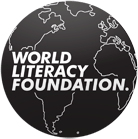World Literacy Foundation
 | |
| Abbreviation | WLF |
|---|---|
| Founded | 2003 |
| Founder | Andrew Kay, CEO |
| Type |
Not-for-profit organisation Educational organisation |
| Focus |
Literacy, Education Children's rights |
| Location | |
| Method | Literacy-based projects |
Key people | Dr Anthony Cree OAM, Chairman |
| Slogan | Knowing how to read and write can break the cycle of poverty. |
| Website | https://worldliteracyfoundation.org/ |
The World Literacy Foundation (WLF) is a global not-for-profit that works to lift young people out of poverty through the power of literacy. Founded in Melbourne, Australia in 2003, the World Literacy Foundation operates on the principle that education is a basic human right, and through the promotion of literacy and the provision of educational resources, aims to eradicate global illiteracy.
Background
Since its establishment in 2003, the World Literacy Foundation has grown to align with the needs of an evolving education sector. The WLF has worked towards forging partnerships with other leading educational and related not-for-profit organisations, and has built long-lasting relationships within communities around the world.
The WLF significantly dedicates its time and resources to conducting research, and uses resulting information to help advocate in local communities as well as on a global scale. It mobilise communities through passionate volunteers, and seeks to give individuals a voice so that they can also act as advocates for literacy within their own communities. The WLF believes that raising community awareness is vital to the improvement of literacy standards.
The WLF annually monitors a range of indicators in the education area and prepares a report on economic and social cost of illiteracy. In 2012, the WLF compiled a report which focuses on the economic and social cost of illiteracy in the United Kingdom. The research was devoted to economic and social cost of illiteracy in the country.[1] It stated that one in five of the UK population is functionally illiterate and this rate costs the national economy 81 billion pounds a year in lost earnings and high welfare spending.
The WLF convened the World Literacy Summit at Oxford University (UK) in April 2012 to stimulate co-operation in the global literacy sector in order to support 796 million illiterate people in developed and developing worlds. The list of invited delegates included about 300 leaders in the fields of government, development, literacy and academic sectors.[2] The Oxford Declaration became the resulting document of this event; it was designed to combine efforts of government, business, non-governmental organizations and educational institutions to promote literacy worldwide.[3]
Community projects
The World Literacy Foundation's projects are aimed at raising global literacy rates and teaching standards. The WLF volunteers and partner communities have worked in Azerbaijan, Indonesia, India, Pakistan, Colombia, Mozambique, Uganda, and other developing countries to provide access to quality education and learning resources to disadvantaged communities.
International Literacy Day campaign
In 1965, UNESCO declared September 8 to be International Literacy Day. Since this proclamation, schools, communities and organisations have united around the world on this day to raise awareness in the hope that it will enable increased accessibility to education in developing nations.
The World Literacy Foundation’s 2016 campaign ‘The Sky’s The Limit’ is an exciting opportunity to participate in International Literacy Day, and promote the profile of literacy within your school and local community.
This year, the World Literacy Foundation has created an innovative campaign that aims to eliminate the digital divide for students in the developing world, and increase student engagement via an exciting digital learning platform.
References
- ↑ Davis, Anna (25 January 2012). "Cost of illiteracy to UK 'tops £81bn each year'". London Evening Standard. Retrieved 28 July 2013.
- ↑ Lukic, David (9 February 2012). "Oxford to host World Literacy Summit". Cherwell. Retrieved 28 July 2013.
- ↑ Claire Provost (3 April 2012). "You can't put a price-tag on literacy". guardian.co.uk. Retrieved 28 July 2013.
External links
- World Literacy Foundation | Official Website
- World Literacy Foundation | Facebook
- World Literacy Foundation | Instagram
- UNESCO | Literacy and Education